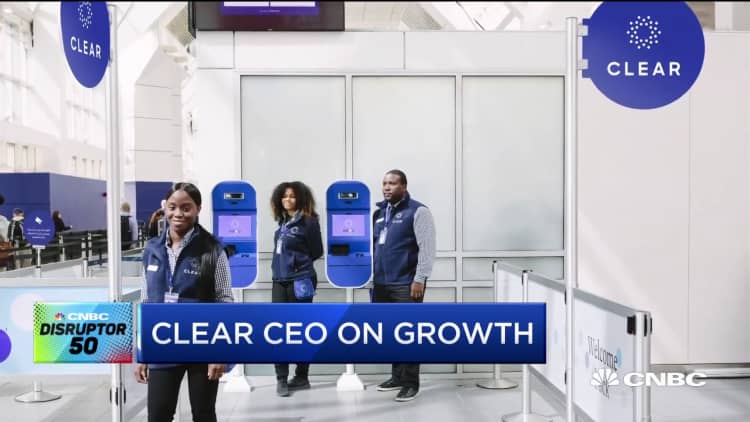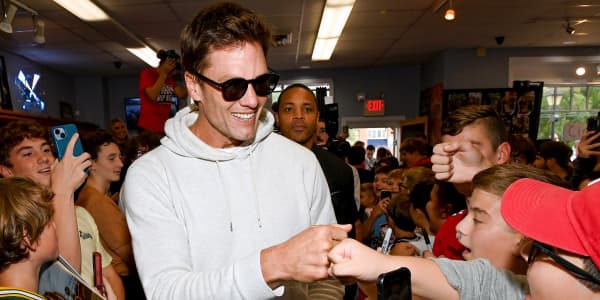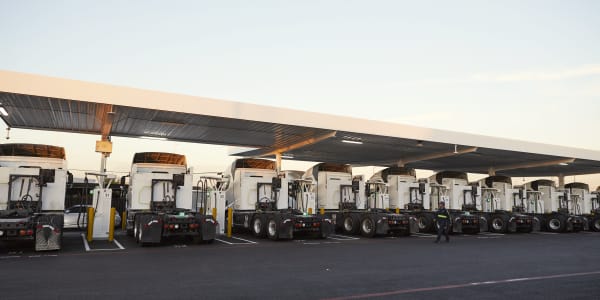Opponents of facial recognition technology scored a victory this week when San Francisco voted to ban use of the biometric security technique in law enforcement. But don't let that leave you with the impression that the U.S. public is raising its eyes rather than lining up to have their bodies scanned.
CLEAR, a biometric security company that many travelers are coming across in airports, is experiencing its most rapid growth, the CEO of the company told CNBC on Wednesday. It took CLEAR seven years — and one acquisition out of bankruptcy — to get to its first 1 million subscribers. In the past eight and a half months, Clear has added another 1 million members; the 1 million users before that most recent growth spurt — which brings the company to a total biometric base of 3 million — came in a period of just under one year.
"So that's the hockey stick you map out when you start a company," said CLEAR CEO Caryn Seidman Becker, referring to the shape of the growth curve. "It's happening."
The New York City-based company, which launched in 2010, uses biometrics (your fingerprint, the iris of your eyes, your face) for identity verification. CLEAR ranked No. 22 on the 2019 CNBC Disruptor 50 list.
Seidman Becker said that while airport security is the use case that most people know for its $180-per-year service, CLEAR has expanded into additional ID replacements, and there will be more from retail and gaming to health care.
In August, CLEAR launched a biometric payment and age validation service.
Beer and e-cigs
The company already handles biometric beer sales in Seattle sports venues, including Seahawks and Mariners games. "Your fingerprint are your age and credit card," she said.
Fans at Seattle's CenturyLink Field and T-Mobile Arena also can buy food with the tap of a finger, which the company said is the first biometric replacement for a government-issued ID in the U.S.
The company has its eye on e-cigarettes and online gaming. "Age validation in e-cigarettes and beer and online gaming ... is crucial to creating safe experiences. We think there are huge opportunities there. ... We believe any place where you are whipping out a wallet and taking out a card to prove that you are you is a place where CLEAR has big opportunities," Seidman Becker said.
North Carolina's Attorney General sued e-cigarette maker Juul on Wednesday, the latest move in an escalating battle between the company and regulators, including the FDA, which has cracked down on sales of e-cigarettes to minors through retail stores where lax identification procedures have helped contribute to what the federal government has called an "epidemic" of teen e-cigarette use.
CLEAR is approved by the U.S. government as a qualified antiterrorism technology with the Department of Homeland Security.
In response to the San Francisco ban on facial recognition technology by law enforcement, announced this week, the CLEAR CEO said that the company starts with the premise that biometrics makes homeland security safer and the customer experience safer and better.
"People now expect a frictionless experience," Seidman Becker said. "Outside the airport, you can call an Uber or Lyft without waiting for a taxi. It's that feeling of control."
As for health care, she did not outline specific plans, but expressed a frustration of many patients with the current verification and enrollment process. "Think about health care and the clipboard. Why the clipboard?"
Voice recognition is next
In addition to its existing facial recognition, and iris and fingerprint scanning, CLEAR thinks voice recognition will be next in biometric security. "We think voice is coming," she said.
As the public embraces more passive forms of biometric screening, like facial recognition and voice — versus fingerprints, for example — Seidman Becker said it is really important that customers opt in and know exactly what they are opting in for and where their data will be.
The type of facial recognition technology that CLEAR offers requires the consumer to enroll and engage with one of the company's pods, different from the case of law enforcement capturing images of a person walking down the street who has not consented. The only place CLEAR has introduced facial recognition to date is at seven Hertz rental car agencies, and only after the consumer opts in.
Because it is reviewed by federal agencies, CLEAR encrypts data at a high level of cybersecurity, she said.
Certification as a qualified anti-terrorism technology by the U.S. Department of Homeland Security includes an evaluation of CLEAR's overall security program, and the Transportation Security Administration (TSA) also determined that its biometric identity systems meet FISMA (Federal Information Security Management Act) HIGH compliance requirements for protecting sensitive data.
"The fact that we are a qualified anti-terrorism technology with Homeland Security means we have built everything focused on security from day one," Seidman Becker said, but she stressed that even before federal reviews were being conducted the company worked with the idea that its "DNA" required building trust in its privacy measures.









